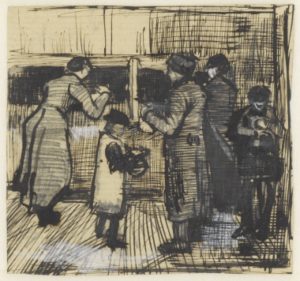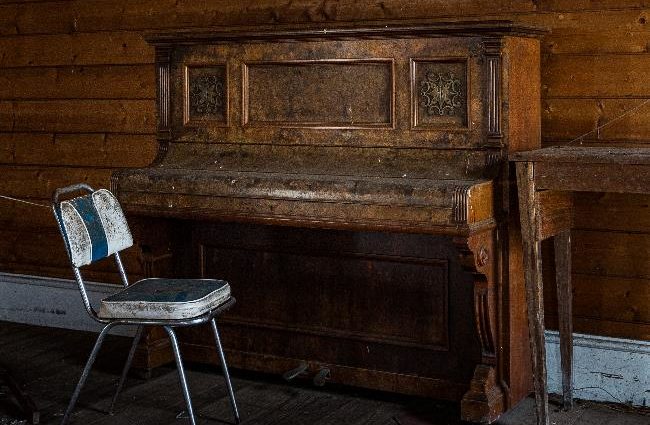When we first arrived in Washington D.C. at the soup kitchen where we would be serving for the next week, we were met by an interesting sight: a visibly outdated building in every aspect, with wavy glass panels next to revolving wooden doors, and avocado green walls from the seventies that everyone wanted to forget.

Once inside, I immediately noticed this stench that kept getting stronger as we went towards the kitchen. We were taken through a dimly-lit, narrow, wooden hallway with vomit-colored carpet. The stench grew worse and worse as we walked down the hallway, and, as we entered the kitchen, it became almost unbearable. The main eating area was a large room with a vaulted and extremely dirty glass ceiling. A few yards away to our left sat a tarnished and neglected piano where no one sat. The entire room was packed to the gills with picnic tables painted either blue, green, or red. The kitchen was in the opposite corner of where we stood, and, as we walked down, I could not help but feel excited that my friends and I would be serving a community where we did not live.
Once we entered the kitchen, we were all given jobs such as cleaning tables, washing dishes, working the assembly line, etc. I opted to go on the assembly line, where I put pieces of bread on the cheap plastic trays for the people’s dinner. The meal trays were flimsy, thin plastic, and all colored red or yellow. While the kitchen staff was cooking the food in the back, we were being told what to do and what to expect. The man who directed us was named Greg, and he made the homeless people out to be barbaric and feral.
“Are they ever nice to us?” I asked. “Isn’t all they want a meal?” I looked at him uncertainly.
He looked down the row of people and replied somewhat cynically,
“No, they are never nice to anyone.”
He adamantly told us the homeless people would be rude and disrespectful and try to take more food than they were allowed – and under no circumstance should we give them anything extra. The food we served them for dinner was detestable: It was a ravioli dish that looked like a pile of poop and smelled disgusting. I crinkled my nose. I had finally found the source of the nauseating smell. The odor emanated from the slop we were handing out, and it made my stomach turn over.
Not long after dinner began, a woman came up to the counter with her plate.
“Excuse me, there’s mold on this bread,” she said, meekly gesturing to her tray where the bread was clearly molded. “Is it too much trouble for y’all to make me another plate?”

Greg demanded to see her tray; he obviously did not believe her. Once he saw the mold, he got quiet and short with her, as if the moldy bread was her fault.
“Ok, we’ll make you a new one,” Greg said reluctantly.
I could not help but feel like I was in a vinyl record that had been played over and over and over again. It was obvious to me that people who worked there were tired of serving the needy and their community, but we volunteers had a different perspective. Debora Kuan writes in her poem, “The Night After You Lose Your Job”:
. . . Wheredo you get to say you clawed throughtheir night terrors, held them through their sweatygrunting and writhing, half-certain a demonhad possessed them . . . (Kuan 16-20)
Kuan conveys the idea that the homeless will go to extensive lengths to have a job. They are desperate for work in order to gain some comforts and normalcy, and not to live a deprived life. In my experience, the people we served were nicer to us than the workers were. They made conversation with us and asked us where we were from and how school was going.
__________________

The great irony of my trip was that, while I was serving people who did not have work but desperately wanted it, I also witnessed a labor protest taking place in D.C. at the same time. Before this trip, I had never seen a protest in real life. I had seen footage of protests on the news that showed demonstrators holding signs, yelling, overturning cars, rioting, looting etc. However, seeing one in person after I helped the homeless people opened my eyes. This encounter allowed me to see just how nice they truly were. They were not the barbaric, feral bums Greg had portrayed them to be. I could not help but feel sorry for the people because all they wanted were decent jobs, better minimum wage, and recognition and respect as human beings. I kept thinking of how before the trip, I thought that, compared to everyone else in Farragut, Tennessee, I was lower middle class, and people looked at me differently than their other friends. After this eye-opening experience, I have realized that I’m extremely fortunate compared to innumerable people across America.
Joblessness is a systemic problem that America has had to face numerous times throughout history. Kimberly Amadeo says in her article “Unemployment Rate by Year Since 1929 Compared to Inflation and GDP”: “The highest rate of U.S. unemployment was 24.9% in 1933, during the Great Depression.” She goes on to show a graph that reveals American unemployment has never been lower than 1.2%, which was recorded in 1944. The population in America was 138,397,345; so, given the unemployment rate of that year, 1,660,768.14 people were without jobs. In 2021, the unemployment rate was 3.9% and 332,915,072 were in America at the time, meaning 12,983,687.808 people were without jobs. If you would like to do the math yourself, just multiply the population of the time by the unemployment percentage, but make sure to add two zeros in front of it. I could go on and on with statistics. I am saying that America (regardless of who is president) has always struggled with, and will continue to struggle with, unemployment for its people.
The homeless problem America faces is on a much larger scale than most people realize. I have gone to many densely populated cities across the U.S. on vacations and mission trips. Anywhere I looked, I saw these makeshift homeless towns that had dozens and dozens of people living in them. I spotted them in abandoned lots, under bridges, at abandoned train stations, and even on city sidewalks. The situation is a truly humbling crisis to think about. Countless people in the U.S. have nothing more than a stolen grocery cart or trash bags in which to store their ragged, dirty clothes and few paltry possessions. And they have no place to live except an old tent or cardboard box. People are born into poverty and, sadly, most people do not get out of it. I want people to be more sympathetic and empathetic towards homeless people. Shannon Alder beautifully says,
Nowhere in the bible did it say, ‘Only show compassion and empathy to those you can trust.’ If we did that, we would be burying homeless people every day.
If we were to treat homeless people like actual humans and not pieces of trash under our feet, this world would be a happier place indeed. The one plea I have is that everyone would lend a helping hand toward their fellow human beings, not just homeless people. It could be something as simple as holding the door for someone or asking them how they are and taking a moment to listen to them. It may seem like a small thing, but it could make someone’s day completely different and better just by saying hello. Like Saul from the Bible, I was on the road to Damascus and had to be blinded before I could see, and, like Job, I have served people and will continue to find ways to serve others.
Although I witnessed many detestable acts from people’s lack of empathy and kindness during my time in the soup kitchen, one example of calm compassion stands out to me. An elderly woman came in with the homeless people every day. She did not get any food or talk to anyone. Instead, she walked calmly to the back of the room and played the neglected, dilapidated piano every time we served a meal. Maybe that is how everyone should act, calmly and with compassion. And, if someone has a compassionate heart, even a neglected piano can play the most beautiful music.

Joshua Hester was born in Gainesville, Florida, and moved to Knoxville, Tennessee, at the young age of one with his family in 2006. Joshua is currently enrolled at Pellissippi State Community College and intends to achieve a bachelor’s degree in computer science. Joshua works as a lifeguard and uses most of his free time to pursue his main hobby of painting. He likes to spend time in the mountains camping and going to the beach whenever he gets a chance.
The following sources were used in this essay:
- Alder, Shannon L. “Nowhere in the Bible Did It Say, Only Show Compassion and Empathy to t…-Shannon L. Alder: Shannon L. Alder Quotes.” Quotss.
- Amadeo, Kimberly. “Unemployment Rate by Year since 1929 Compared to Inflation and GDP.” The Balance, The Balance, 3 Apr. 2022.
- Kuan, Debora. “The Night after You Lose Your Job by Debora Kuan.” Poetry Foundation, Poetry Foundation, 2021.
**Featured image by Matt Palmer on Unsplash, cropped

This is a lovely story, and we need much more like it in this world. However, I do take exception with one thing–in doing the unemployment figures, you’re counting every person, including the unemployable–children, the elderly, disabled. You’d do better to use a figure for adult population between 18 and 65, for instance, although many older adults work at least part time past 65. It is interesting to note your passion for this subject publishing now, when the job market is desperately seeking employees, when there are many jobs open for every person who will work. Still, loved this piece, keep writing!
Good work here. Glad to see AppalachiaBare put it out there.
I enjoyed this article very much. He statistics showed some interesting information in comparison to other years of our history. I could picture the building and all the interior by his descriptions. I almost smelled the yucky sounding food. Keep up the good work and keep on writing. You have quite a talent, young man.
I thoroughly enjoyed reading your article. The words vividly describe the sights and smells of the soup kitchen and it’s shameful how some of the volunteers treat the ones they’re supposed to be helping. I appreciate your compassion and encourage you to keep writing!
What an beautiful story Joshua! You make perfectly timed use of metaphors and paint a very vivid picture of the soup kitchen with your words. I thoroughly enjoyed reading about your time serving others, and I couldn’t be more proud of you! – Dad